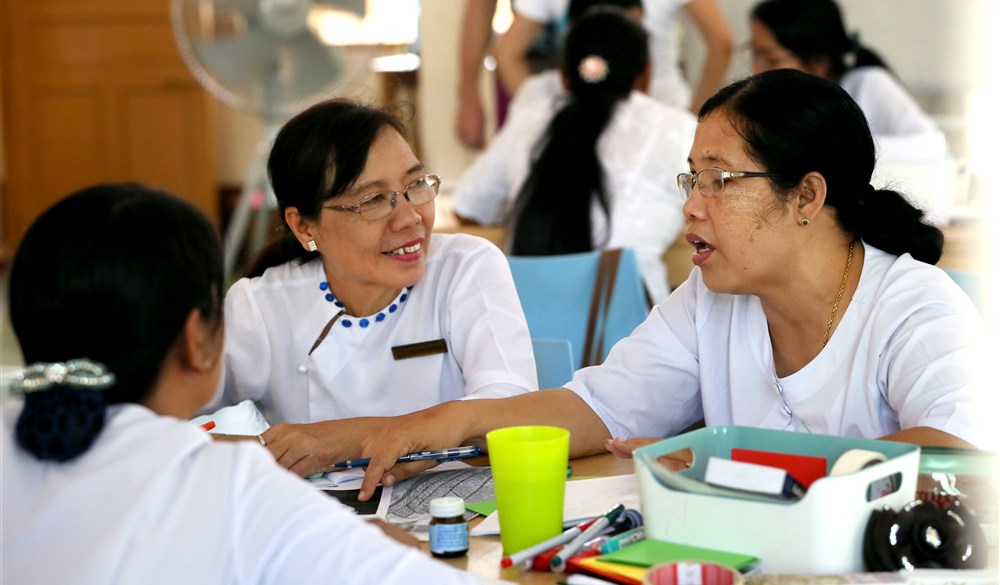Supporting Women in Myanmar
Story

This story was written by volunteer Alison Chan in Myanmar.
Six months ago, I was working for one of Canada’s largest and oldest organizations serving girls and women. I was fortunate to have a stable, secure job in a field I was interested in, with a very supportive manager. And although travel was a big part of my lifestyle, I still had this nagging feeling in the back of my mind that I needed to get out of my comfort zone—both professionally and personally.
On Sunday, June 5, 2016, I arrived in Yangon, Myanmar to work as a Gender Advisor for Women’s Initiatives Platform, a national organization working toward the elimination of violence against women and increasing female political participation in Myanmar.
Coming to Myanmar has been one of the best decisions I’ve made. From a personal standpoint, the travel in Myanmar is incredible. Under a military government, the country has not developed its tourism industry at nearly the same pace as neighbouring countries such as Thailand. This means that Myanmar’s landscape has been largely untouched by globalization, and travellers can experience traditional ways of life and culture.
From a professional standpoint, the work I am doing is the most interesting and complex I have done so far in my career. As the military government was not an inclusive institution for women, they have not been able to hold public office or gain real political power for nearly five decades. Now that Myanmar has implemented a semi-civilian government, women activists, leaders and politicians are emerging. However, due to their longstanding exclusion from politics, many women who are interested in getting involved still lack training and experience in areas such as public speaking, negotiating, and policy-making.
Working Against Violence
As it is in many other countries, violence against women—particularly domestic violence—is prevalent and frequently regarded as a private matter. Moreover, the implicit gender bias in the judicial system (with most judges, lawyers, and law enforcement officers being men) can impact justice for women.
Violence against women and female political participation are the primary issues that Women’s Initiatives Platform works to address. As the Gender Advisor, I juggle a wide range of responsibilities including proposal writing, reporting, website development, developing and facilitating workshops, and more. In August 2016, I delivered a two-day training on gender equality to 20 women activists from across the country. I took this opportunity to create a two-way learning dynamic. I shared what I knew globally about gender inequality, and offered potential solutions. I also asked participants to share experiences from their communities with regards to social, economic, and political inequality. The amount of knowledge that circulated in that room was incredible.
Although by law women can vote, run for office, are protected against violence, and have the right to own property, this does not always translate into practice. Traditions, cultural customs, and longstanding gender norms act as barriers for women to gain power. In certain villages, women cannot run for head of village or administrative officer. If a woman runs a business and it fails, the community may blame it on her gender as opposed to a lack of education, training, mentorship, or just simply bad luck.
Volunteers Connecting with Communities
One of the most important things volunteers can do is challenge traditions and customs that hold back progress, development, and respect for human rights. This means we need to provide activists and allies with the support needed to organize, vocalize, and advocate. While local organizations may have the passion and vision for reform, they sometimes lack the capacity. This is where international volunteers play a crucial role. Whether they are gender experts, communication specialists, financial advisors, or language Instructors; anyone with the skills and heart to volunteer has the ability to affect change, empower activists, and contribute to sustainable development. We can provide technical guidance, help create more efficient processes, mentor and give power back to the people.
Significant social and economic changes still lie ahead in Myanmar and it will take decades to see the impact of these changes. But as long as international volunteers continue to extend their skills abroad, those changes are inevitable.
MAKE A DONATION AND HELP SEND MORE VOLUNTEERS WHERE THEY’RE NEEDED MOST